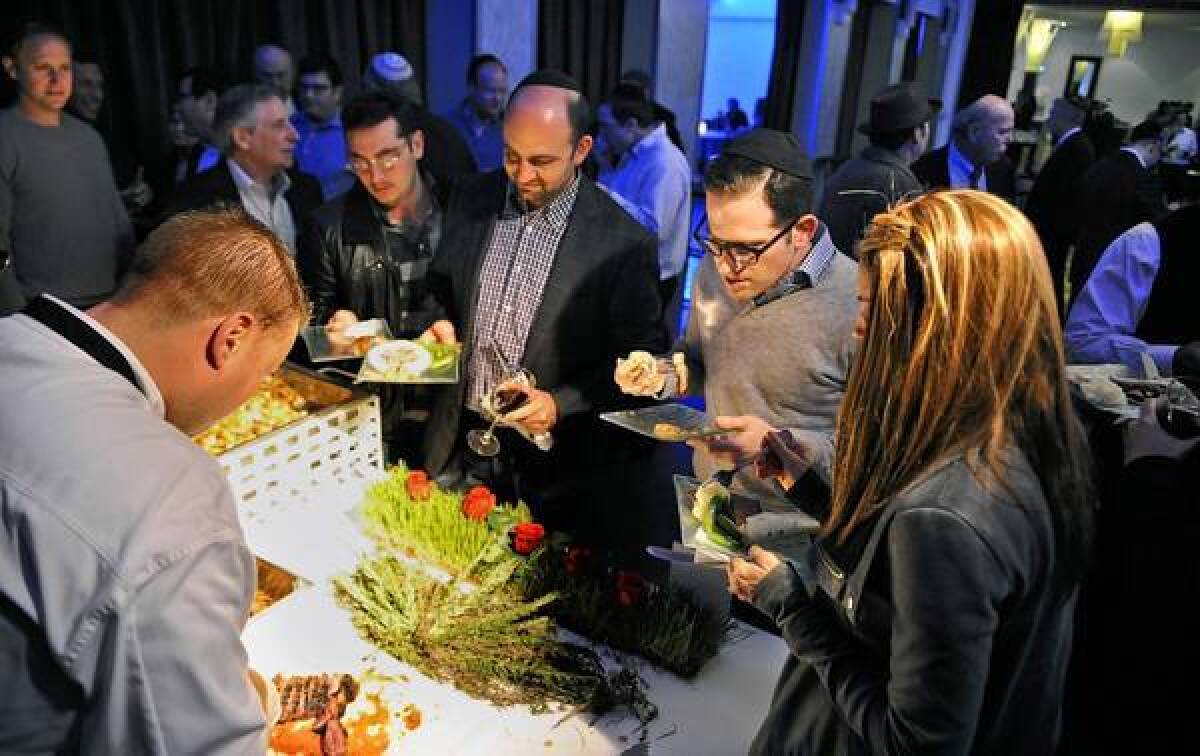Jewish club explores kosher in new translations

Mounds of juicy meat glisten in hot pans and on nicked carving boards in the dining room of the Mark on Pico Boulevard. Braised sirloin with oregano and onion; Santa Maria tri-tip with garlic, molasses and chutney; rich flank steak tacos with lime and salsa; English roast with horseradish; bone marrow with red wine and olive oil; and piles of filet mignon, New York strip and rib-eye are all on offer.
Lining up for service are more than 100 Jews, most of whom have kept kosher for life. Due to the rules governing kashrut (Jewish dietary law), these enthusiastic dinner guests have never before eaten meat from the hindquarters of a cow (the sciatic nerve must be removed to make it kosher, an involved process).
However, tonight they can, thanks to a 17-month-old kosher foodie group called Beverlywood Supper Club. Founded by a food enthusiast named Eddie Fox, the club arranged to fly out a New York City rabbi, Avidan Elkin, to supervise the slaughter and preparation of the animals for this event. He’s one of the few rabbis in the country certified to do so.
The supper club stops at nothing to offer its members the finest in dining experiences formerly foreign to them. Indian, Korean, Cuban, Vietnamese, regional Southern and Japanese dishes have all been made kosher in the name of bringing cultures and ideas together through the ritual of sharing food and table.
“I had never been in a kosher home before, and I was learning what dishes go into what sink, and I was anxious not to mess it up because it’s sacred,” says Aarti Sequeira, who has a show on Food Network and acted as a guest chef for the Indian dinner alongside the supper club’s resident chef, Katsuji Tanabe, of Mexikosher. “And afterward, one man came up to me and he said, ‘I just want to kiss you,’ and he was beside himself and nearly teary. It made me teary too.”
Fox says the proliferation of food shows on TV inspired him to create the supper club, which generally convenes in a private kosher home with a limited guest list that has grown from about a dozen to more than 60. Most guests are adventurous couples in their 30s who are drawn by the prospect of experiencing new flavors and ingredients.
“I like learning from other people and cultures,” Fox says. “For me food is an avenue to a person’s heart — it helps you get to know who they are. And if we can do that through kosher food, even better.”
Fox found a willing partner in Tanabe, who was born in Mexico City and is half Mexican and half Japanese. Tanabe said he was drawn to cooking kosher food because he saw it as a largely unexplored niche that would allow him to distinguish himself among a growing field of star chefs.
“Challenging myself is in my nature,” says Tanabe, using tongs to dish a juicy piece of Kansas strip steak onto a woman’s proffered plate. “Normal people don’t own restaurants, but even more crazy people own kosher restaurants without being Jewish.”
Entering the kosher community is just as alluring to the guest chefs as it is for the supper club members to enter once-forbidden culinary worlds.
Takami Sushi chef Stan Ota, who prepared the Japanese supper club dinner, says that crafting the menu was a great challenge. He had to decipher the spiritual parlance of Judaism and translate it via his preparation and ingredient choices. He says some of what he learned will carry over to his daily work in the restaurant. The same goes for Sequeira, who, in keeping dairy and meat separate, found that she liked coconut milk better than cream or yogurt in her chicken korma.
The rules of cooking kosher are complicated and exact, but the best way to explain them, says Tanabe, is “because God said so.”
Guest speaker Rabbi Steven Weil takes that explanation a step further via an impromptu food sermon during the steak dinner.
“You know the saying, ‘Where there’s no schmaltz, there’s no taste,’” says Weil, as diners pile their plates high with savory meat prepared with the greatest of care. “When there’s a fat component, it produces a much tastier piece of meat ... and some of the finest cuts come from the hindquarters. Until tonight, until Rabbi Elkin, you and I are not used to partaking of that.”
